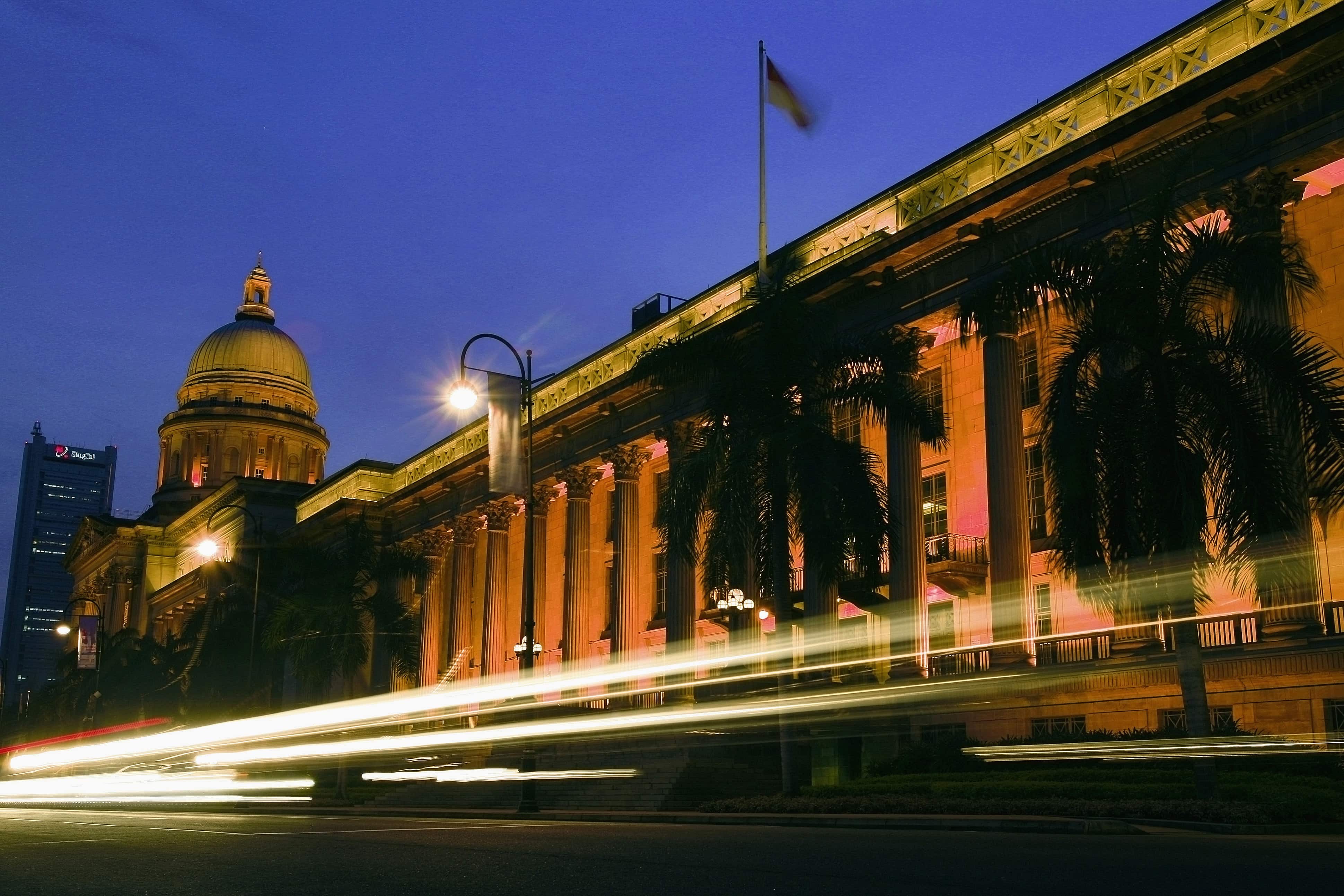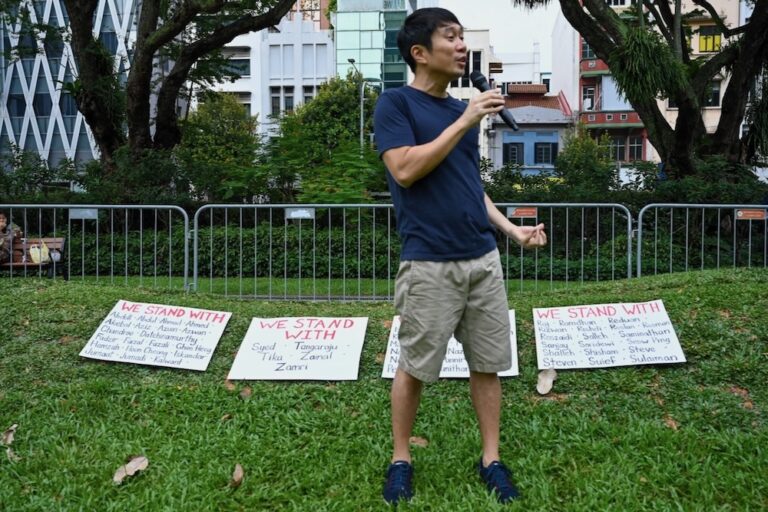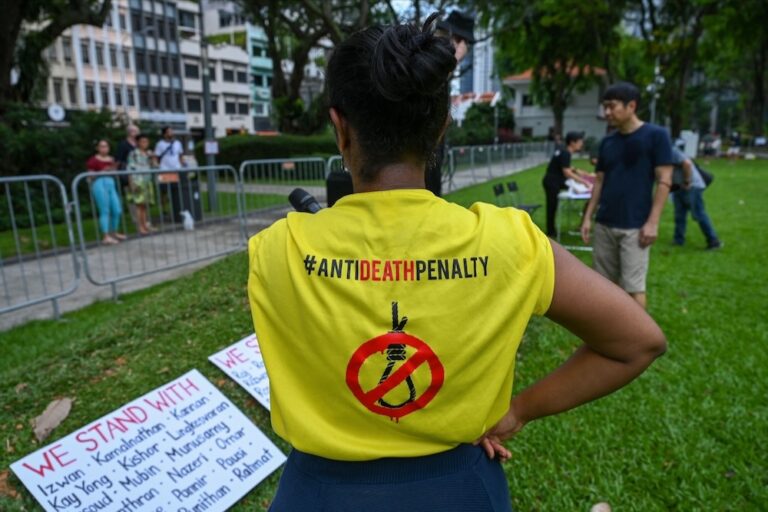Prominent blogger Alex Au Wai Pang faces a fine and imprisonment when he is sentenced on 5 March.
This statement was originally published on hrw.org on 22 February 2015.
A Singapore court’s conviction of a prominent blogger for contempt of court violates his right to freedom of expression, Human Rights Watch said today. Alex Au Wai Pang faces a fine and imprisonment when he is sentenced on March 5, 2015.
Singapore’s parliament should revise the penal code to eliminate the archaic, colonial-era offense of “scandalizing the judiciary,” Human Rights Watch said.
“Alex Au’s blogging on judicial accountability in Singapore furthers the public’s right to information,” said Phil Robertson, deputy Asia director at Human Rights Watch. “Sending him to prison would merely highlight the injustice of Singapore’s archaic crime of ‘scandalizing the judiciary.'”
On January 22, the High Court convicted Au of contempt of court for a blog posting in October 2013 on his website Yawning Bread. The blog, “377 Wheels Come off Supreme Court’s Best Laid Plans,” deals broadly with two cases involving the criminalization of consensual sex between adult men as defined in penal code section 377A.
The charge against Au focused on his published observations about court scheduling. He wrote that a court challenge to section 377A in a case involving a man named Tang Eng Hong, who was arrested in a public toilet with another man, was filed before another challenge, involving the case against the gay couple, Kenneth Chee and Gary Lim. Au pointed out the discrepancy that the couple’s case was to be heard at the Court of Appeal before Tan Eng Hong’s case, which had been filed first. He raised questions about the role of Chief Justice Sundaresh Menon in setting the court’s calendar to ensure his participation in hearing the constitutional challenge against section 377A.
During the trial, Au’s lawyers argued that “innuendo, insinuation, and imputation” do not make for contempt. They noted that in a similar case against the author Alan Shadrake in 2011, the sentencing decision stated that comments considered to be “scandalizing to the judiciary” had to not only pose a credible threat to the reputation of the judiciary but also qualify as unfair criticism – that is, irrational, dishonest, or abusive. As Au wrote on his blog, “I take the view that my writings constituted fair criticism, and that the concept of fair criticism is to protect the individual’s right to freedom of speech and expression.”
International human rights law protects the right to freedom of expression. Article 19 of the Universal Declaration of Human Rights, which is broadly recognized as reflective of customary law, states that, “Everyone has the right to freedom of opinion and expression; this right includes freedom to hold opinions without interference and to seek, receive, and impart information and ideas through any media.”
International standards only allow content-based restrictions on expression in extremely narrow circumstances, such as defamation or threats to national security or public order. Restrictions must be provided by law, strictly construed, and necessary and proportionate to the interest protected.
The United Nations Human Rights Committee, in its General Comment No. 34 on the right to freedom of expression, states that “the mere fact that forms of expression are considered to be insulting to a public figure is not sufficient to justify the imposition of penalties.” The Human Rights Committee monitors the compliance of states parties to the International Covenant on Civil and Political Rights, which Singapore has not ratified.
In addition, Singapore, as a member of the Commonwealth, should take into account the Commonwealth Principles on the Accountability of and the Relationship Between the Three Branches of Government, which state in article 7(b) that “criminal law and contempt proceeding should not be used to restrict legitimate criticism of the performance of judicial functions.”
Several months before Au’s blogs were posted, the British parliament, noting that the offense was last prosecuted in the United Kingdom in 1931, passed the Crimes and Courts Act of 2013, which abolished “scandalizing the judiciary” as a form of contempt of court. Other Commonwealth countries, including New Zealand, Canada, and Brunei Darussalam, have also long since ceased to prosecute this contempt charge.
“Singapore’s courts, like any other public institution, are strengthened, not weakened, by open debate on issues of general concern,” Robertson said. “The prosecution of Alex Au for speaking out is just one more example of Singapore’s willingness to misuse law to gag its critics.”



